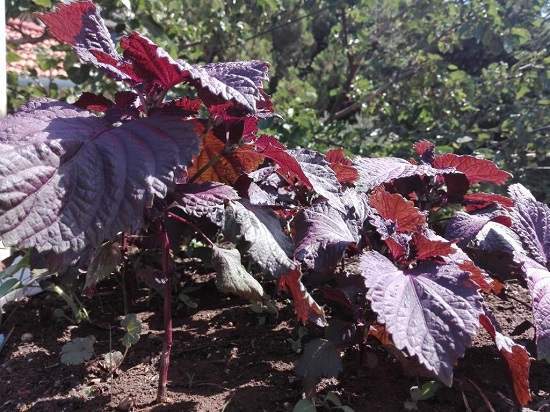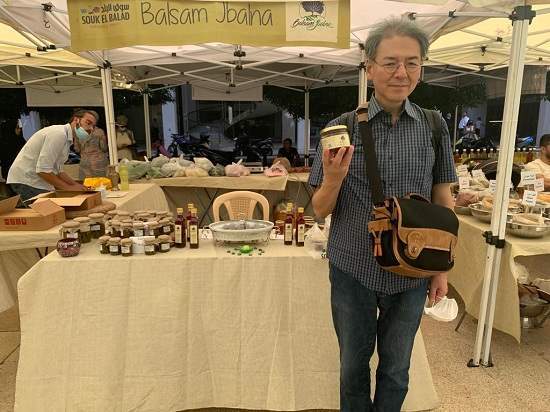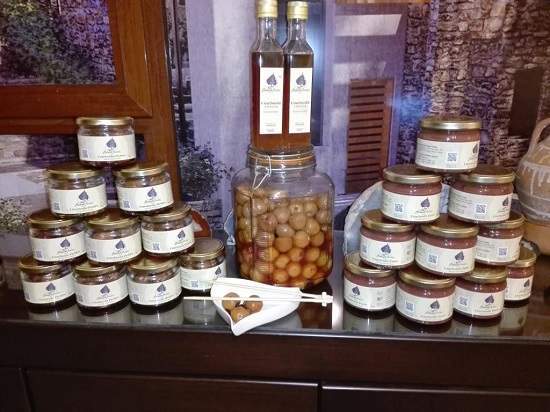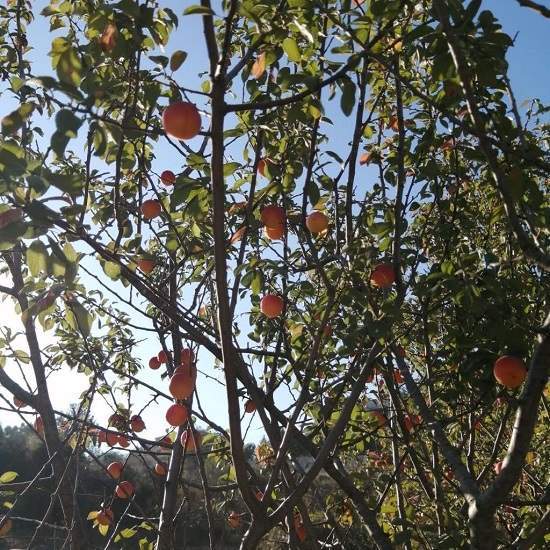BEIRUT — Umeboshi, pickled or fermented Japanese plums, are a
rare and expensive delicacy with macrobiotic health benefits that are now being
cultivated, produced, and packaged in preparation for export in
Lebanon. One
local company is taking wild plums that grow on Mount Lebanon at elevations in
excess of 1,400 meters above sea level and creating the Japanese dish.
اضافة اعلان
Hanan Bou Najm, a macrobiotic nutritionist and founder of
Balsam Jbalna, the company that makes Lebanese umeboshi, started her business
in response to a shortage of Japanese umeboshi. The delicacy is an essential
part of the macrobiotic dietary lifestyle. “Due to the pandemic we couldn’t
find umeboshi from Japan locally,” Bou Najm said, adding that when she asked
around in villages and among the farming community, she found that Lebanon had
a very well-kept secret.
 Wild plums and shiso leaves grown in Lebanon. (Photos: Handouts from Hanan Bou Najm)
Wild plums and shiso leaves grown in Lebanon. (Photos: Handouts from Hanan Bou Najm)
“I did my research and found that Lebanon has a lot of wild
plum trees, and that our mountains were the best source for this type of wild
plum which is from the prunes family,” Bou Najm told
Jordan News. “It is beyond
organic, it grows wild, it is untouched!” In Japanese “ume” means plum, while
“boshi” means fermented, although at first, she tried cooking the plums and
pickling them, but found that fermentation was best.
She explained that this type of wild plum had been used by
Lebanese farmers over 500 years ago, who used to cook and ferment the plums
then turn them into a paste, which they then used in their cooking instead of
tomato paste. In fact, Bou Najm pointed out, that when tomatoes first arrived
to Lebanese shores from the new world via Europe, farmers used to feed them to
cattle to increase milk yield, rather than eat them.
 A Japanese customer poses with Lebanese umeboshi. (Photos: Handouts from Hanan Bou Najm)
A Japanese customer poses with Lebanese umeboshi. (Photos: Handouts from Hanan Bou Najm)
The intense sour and salty notes make umeboshi a perfect
condiment to marry with Lebanese cuisine. Balsam Jbalna also makes and sells umeboshi
paste and vinegar, which is sold via Souk el Balad, an artisanal foods and
produce market that pitches its tents at the Beirut Souks mall every Saturday.
However, in a country with serious pollution issues, Bou
Najm was very careful to go to the least accessible and highest mountain plains
and valleys to harvest this wild fruit. “We would park our cars and walk up for
two hours. We were 10 men and women, and we would collect the plums as well as other
wild berries, which we mixed in with our fermented plums,” Bou Najm said.
Last year she imported organic shiso seeds, and she planted
and successfully cultivated the first commercial shiso plants in Lebanon. The
shiso leaf is an essential “third ingredient” in the process of making umeboshi,
in addition to the wild plums and the wild berries.
 A photo of Balsam Jbalna’s products.(Photos: Handouts from Hanan Bou Najm)
A photo of Balsam Jbalna’s products.(Photos: Handouts from Hanan Bou Najm)
“We add the wild berries exclusively for our Balsam Jbalna
product, Japanese umeboshi does not include wild berries. I added these berries
because they have antioxidant qualities that combat cancer and cardiovascular
problems,” Bou Najm said.
The wild plums are collected the same way wild Zaatar is
collected, straight from the high mountain plains and valleys, which she said are
so inaccessible that they do not belong to anyone, it is sort of like an open
air pantry.
“Last year we produced three tonnes of umeboshi, this year
we doubled that yield,” Bou Najm said. In fact, her project was of such a
unique and special nature, on top of being an entirely wild and natural
product, that it caught the eye of USAID.
“They have been working with me and supporting me for a year,
I have been attending training courses they arranged for me in anticipation of
starting to export my product,” Bou Najm said. But it will likely be a “shy
start” into the export market at first, she said.
Her initial studies into the demand for umeboshi in Europe
found that in France and Italy, among other export markets, demand for the
delicacy rose by 90 percent during the pandemic period, coupled with a shortage
of Japanese imports of the fermented pickled plums.
In addition to creating a value added product that is in
high demand worldwide, Bou Najm has created a locally affordable alternative of
a specialty Japanese product that is within Lebanese consumers’ reach, selling
it for a fraction of the price of imported varieties. Exports of the plums,
paste, and vinegar are supposed to help bring in much needed hard currency to
the country during the current tough economic situation.
 Wild Lebanese plum trees bearing fruit.(Photos: Handouts from Hanan Bou Najm)
Wild Lebanese plum trees bearing fruit.(Photos: Handouts from Hanan Bou Najm)
“It is important to create awareness of this wild plum all
across the region if only for its health benefits. In the macrobiotic diet we
have to eat at least one plum a day. In the Hunza Valley in Pakistan, where
locals live to be well over a 100 years old, people there eat three of this
kind of plum a day,” Bou Najm said.
She warns however, that these plums are not to be eaten raw,
they are far too hard and sour. “You can try and bite into one, but you will
throw the rest of it away,” she quipped.
Read more Lifestyle



